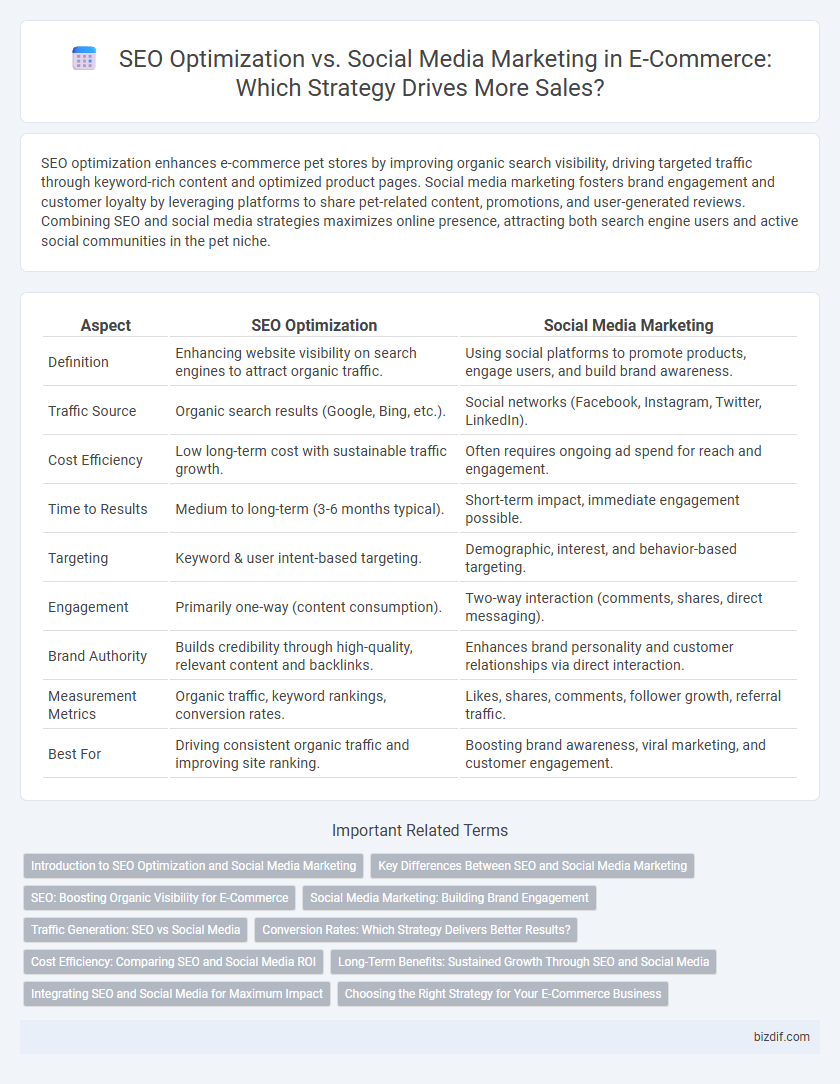SEO optimization enhances e-commerce pet stores by improving organic search visibility, driving targeted traffic through keyword-rich content and optimized product pages. Social media marketing fosters brand engagement and customer loyalty by leveraging platforms to share pet-related content, promotions, and user-generated reviews. Combining SEO and social media strategies maximizes online presence, attracting both search engine users and active social communities in the pet niche.
Table of Comparison
| Aspect | SEO Optimization | Social Media Marketing |
|---|---|---|
| Definition | Enhancing website visibility on search engines to attract organic traffic. | Using social platforms to promote products, engage users, and build brand awareness. |
| Traffic Source | Organic search results (Google, Bing, etc.). | Social networks (Facebook, Instagram, Twitter, LinkedIn). |
| Cost Efficiency | Low long-term cost with sustainable traffic growth. | Often requires ongoing ad spend for reach and engagement. |
| Time to Results | Medium to long-term (3-6 months typical). | Short-term impact, immediate engagement possible. |
| Targeting | Keyword & user intent-based targeting. | Demographic, interest, and behavior-based targeting. |
| Engagement | Primarily one-way (content consumption). | Two-way interaction (comments, shares, direct messaging). |
| Brand Authority | Builds credibility through high-quality, relevant content and backlinks. | Enhances brand personality and customer relationships via direct interaction. |
| Measurement Metrics | Organic traffic, keyword rankings, conversion rates. | Likes, shares, comments, follower growth, referral traffic. |
| Best For | Driving consistent organic traffic and improving site ranking. | Boosting brand awareness, viral marketing, and customer engagement. |
Introduction to SEO Optimization and Social Media Marketing
SEO optimization enhances e-commerce visibility by improving website ranking on search engines through keyword research, on-page optimization, and quality backlink building. Social media marketing leverages platforms like Facebook, Instagram, and TikTok to drive traffic, engage customers, and build brand awareness via targeted ads and content sharing. Combining SEO with social media strategies boosts organic reach and customer acquisition, maximizing overall online presence.
Key Differences Between SEO and Social Media Marketing
SEO optimization focuses on improving website visibility in organic search results using keywords, backlinks, and on-page content, driving long-term, sustainable traffic. Social media marketing leverages platforms like Facebook, Instagram, and Twitter to build brand awareness, engage audiences, and generate immediate traffic through posts and paid ads. While SEO targets search engine algorithms for ranking, social media marketing prioritizes audience interaction and viral content sharing to enhance brand presence.
SEO: Boosting Organic Visibility for E-Commerce
SEO optimization drives sustained organic visibility for e-commerce by enhancing website structure, keyword targeting, and content relevance. Improved search engine rankings increase qualified traffic and conversion rates without continuous ad spend. This long-term strategy outperforms social media marketing in maintaining consistent online presence and attracting intent-driven shoppers.
Social Media Marketing: Building Brand Engagement
Social media marketing drives brand engagement by fostering direct interaction with customers through platforms like Instagram, Facebook, and TikTok, enhancing brand visibility and loyalty. Consistent content creation and targeted campaigns increase user participation, shares, and comments, creating a community around the brand. Leveraging social media analytics helps optimize strategies, improving customer retention and conversion rates more effectively than traditional SEO alone.
Traffic Generation: SEO vs Social Media
SEO optimization drives organic traffic by improving website visibility on search engines through keyword targeting, quality content, and technical enhancements, resulting in long-term, sustainable visitor growth. Social media marketing generates immediate traffic by leveraging platform-specific algorithms, engaging content, and influencer partnerships to reach diverse audiences quickly. Combining SEO with social media efforts maximizes traffic generation by capturing both intent-driven searches and real-time social interactions.
Conversion Rates: Which Strategy Delivers Better Results?
SEO optimization consistently drives higher conversion rates for e-commerce by targeting intent-driven organic traffic, resulting in more qualified leads ready to purchase. Social media marketing excels in brand awareness and engagement but often yields lower direct conversions due to its broader audience reach and less targeted nature. Data shows SEO delivers conversion rates averaging 14.6%, compared to social media's 1.9%, underscoring its effectiveness for turning visitors into buyers.
Cost Efficiency: Comparing SEO and Social Media ROI
SEO optimization delivers long-term organic traffic with lower ongoing costs, resulting in higher cost efficiency and sustainable ROI for e-commerce businesses. Social media marketing offers rapid audience engagement and brand visibility but often requires continuous budget allocation for paid ads, impacting overall ROI. Analyzing cost per acquisition and lifetime customer value reveals SEO as a more cost-effective strategy for long-term growth, while social media marketing excels in short-term promotional campaigns.
Long-Term Benefits: Sustained Growth Through SEO and Social Media
SEO optimization drives sustained e-commerce growth by enhancing organic search visibility and building authoritative backlinks that increase website traffic over time. Social media marketing boosts brand awareness and customer engagement through consistent content sharing and targeted advertising, creating loyal communities around products. Combining SEO's lasting search engine presence with social media's dynamic interaction results in a comprehensive strategy that ensures long-term customer acquisition and revenue growth.
Integrating SEO and Social Media for Maximum Impact
Integrating SEO and social media marketing amplifies e-commerce visibility by combining keyword-driven content optimization with targeted social engagement strategies, leading to increased organic traffic and higher conversion rates. Leveraging social media signals such as shares and likes enhances search engine rankings, while optimized SEO content fuels social media campaigns with relevant, discoverable information. This synergy creates a cohesive digital presence that maximizes brand exposure, boosts customer trust, and accelerates revenue growth.
Choosing the Right Strategy for Your E-Commerce Business
SEO optimization increases organic traffic by enhancing website visibility through keyword targeting, backlink building, and on-page SEO techniques, making it essential for long-term growth in e-commerce. Social media marketing drives immediate engagement and brand awareness by leveraging platforms like Instagram, Facebook, and TikTok to reach specific demographics with targeted ads and influencer partnerships. Choosing the right strategy depends on your business goals, product type, and budget, with many successful e-commerce stores integrating both SEO and social media marketing for maximum impact.
SEO Optimization vs Social Media Marketing Infographic

 bizdif.com
bizdif.com